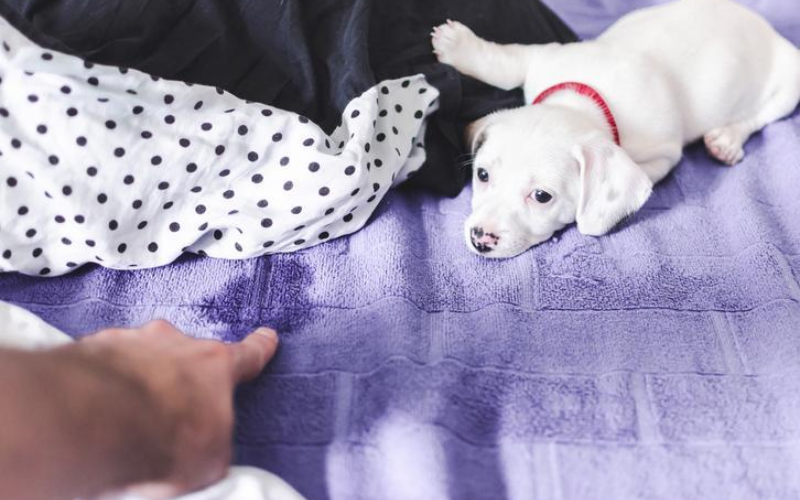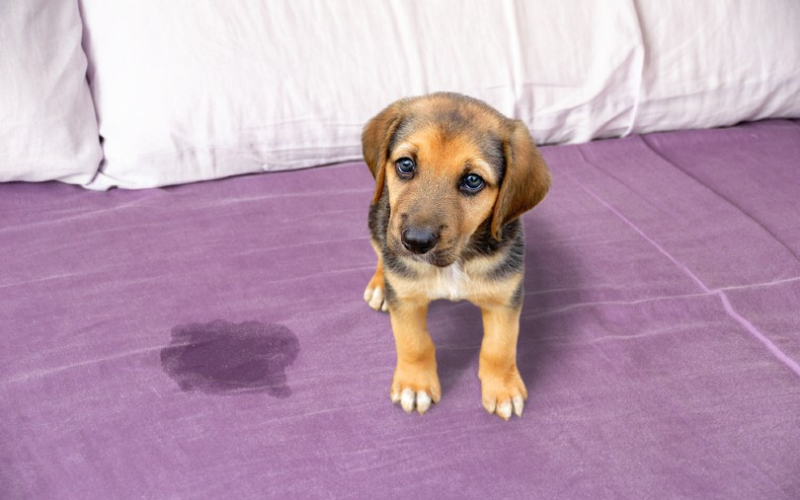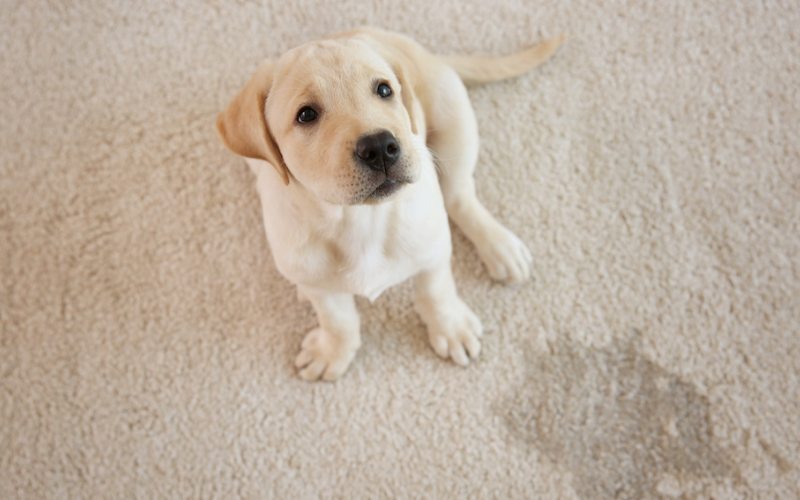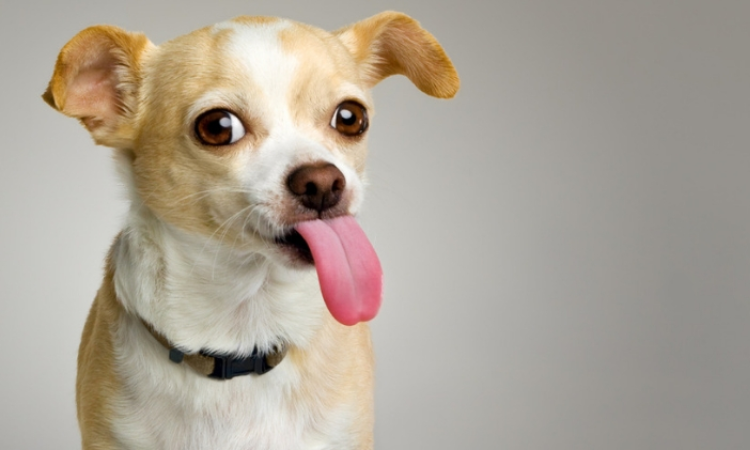If your dog regularly has “accidents” in the house, especially in your bed, you’re probably feeling very frustrated. As for us, we understand. All you want to do when you get home is cuddle up with your dog on your dry, clean bed. Nonetheless, you can’t help but wonder, “Why did my dog pee on my bed…Again?!”
You should never hit, scream at, or yell at your dog, no matter how frustrating the situation may become. Instead, opt for the more cunning approach. To stop your dog from peeing on the bed, you need to get to the bottom of why this is happening. Let’s start with some of the things that could be causing this and some of the things that you could try to fix it.
Why Did My Dog Pee on My Bed & How Should I Deal With It?
When you first see a puddle on your bed, the most important thing to do is go through this list and cross down each possible cause as you go.
Disorders and Illnesses
If your dog suddenly started urinating on the bed and other furniture, it’s important to get it checked out by a vet right away. Many different medical conditions can lead a dog to start peeing in inappropriate places. Dogs frequently suffer from urinary tract infections, making this a popular medical explanation.
Your veterinarian will likely prescribe medicines if they determine through analyzing a urine sample that your dog does, in fact, have a UTI. If a UTI is ruled out as the cause, then other medical issues should be investigated. Your dog may be experiencing issues with his or her kidneys or bladder.
Tumors, bladder stones, and inflammation are all potential causes of frequent urination that are not desired. Keep an eye on your dog’s general demeanor because more serious ailments will manifest themselves in different ways. Medical conditions unrelated to the urinary system, such as Cushing’s syndrome, diabetes, or spinal traumas, can all have a role in causing or exacerbating this problem.
Urine incontinence is one of the last causes your vet will rule out if your dog is on the older side. Urinary incontinence occurs when a dog loses control over when it has to relieve itself. This condition, which typically affects puppies, can occur with others, such as those listed above. In that case, your vet may recommend taking some medication.
Concerns Related to Training
If your dog is still young, it’s more probable that training issues than medical issues are to blame for this behavior. However, it’s preferable to err on the side of caution. A visit to the veterinarian is a great idea regardless of how old your dog is. If your veterinarian has ruled out any medical causes, you should look at training issues.

If you have a puppy soon enough, you can teach it to stop doing it. Puppies can be trained to hold their bladders and follow specific commands. However, as they become older, you should make sure they are fully housetrained. If your dog starts wetting the bed, you may want to consider retraining it or reinforcing the training it already received.
Problematic Behavior
It’s possible that training is at the root of your dog’s behavioral issues, but that’s not always the case. After that, you can begin working on the specific issue. That includes, in this case, urinating on the bed. One possible explanation is the marking of territory. This sort of behavior is more common among men than among women.
Because of the hormonal basis, altering your dog is an effective strategy. However, this behavior may develop into a habit with time. Therefore, even if you do manage to successfully alter your dog, he or she may still find opportunities to urinate on furniture and carpets. If that’s the case, you’ll need to schedule some time to retrain your dog.
How to Differentiate Marking From Peeing?
There is a way to determine whether your dog is marking territory in addition to urinating. There’s also the issue of how much one urinates. Your dog had a full bladder, as evidenced by the size of the puddle. They probably needed to go to the bathroom immediately because they were unable to hold their bladder or for some other reason.
On the other hand, when marking, they’ll only urinate a little bit, leaving behind little puddles. You should expect to find plenty of them lurking around the house. This is clearly a case of marking. It’s also possible that your dog’s strong emotions are at blame. Inappropriate urination has been linked to a wide range of emotions, including elation, terror, submission, and anxiety.
How will you know for sure that these factors are to blame? Keeping a close eye on your dog and the area around him or her while he or she urinates is your best bet. Keep track of when your dog urinated, what happened immediately beforehand and on that day, and if the dog urinated somewhere else in the house.
A Step-by-Step Guide on What to Do When Your Dog Pees on Your Bed!
Now that we’ve covered why your dog could be wetting the bed, let’s talk about what you can do to stop it from happening again.
Starting with the most important item—a checkup—is how we recommend reading the list.
1. A Visit to the Vet
Incorrect urination is not, however, a situation in which a trip to the vet should be considered a last resort. Since you now know about all the possible medical causes, it makes sense to make sure your dog is in good health before beginning retraining. Obviously, training shouldn’t be attempted on a sick dog. It wouldn’t help your dog at all, and it would just add unnecessary suffering to his or her experience.
2. Housetraining
Depending on how old your dog is, you may have yet to start housetraining him. That’s fantastic news if it’s true. You will probably figure out how to fix the issue rather quickly. The housebreaking process may need to be repeated even if the dog has been through it before.
3. Identify the Context
If you think your dog is trying to tell you something by wetting the bed, you should pay attention to the patterns in this behavior. Investigate the root of the problem in order to find a solution. A dog, for instance, could be affected by tense situations at home. If you work to strengthen family ties, everyone will profit.

If you’re bringing work home with you and causing your dog stress, he or she may catch on. If you can, please prevent this from occurring. If you can’t remove the source of the problem, think about ways to help your dog deal with stressful situations. Perhaps you’re wondering, “How do I do that?”
Yes, depending on the cause. If your dog is afraid of other dogs in the neighborhood, you should choose a dog that is very friendly and work on socializing your pet with it.
4. Increase the Number of Walks
Depending on your schedule, your dog may not get enough exercise outside. To be a good dog owner, you need to spend time with your pet and make sure it has all it needs to thrive. Take regular breaks to stretch your legs or use the restroom. You should take them outside more often during the day if you find that they are urinating in the bedroom.
You don’t always have to observe the conventional wisdom and walk for exactly one hour. In little more than fifteen minutes, one should be able to satisfy one’s most fundamental requirements. In about 15 minutes, they will be able to enjoy fresh air, use a bathroom, and see the sun.
This should be done every time your dog gets up, drinks water, or eats. During these times, your dog is most likely going to use the bed as a bathroom. If you notice this happening frequently, it’s best to leave. Acknowledge and reward the dog each time it relieves itself on these walks. The trick is to link only positive experiences.
You shouldn’t yell or scold him if he urinates within the house, either. There’ll be more on that below.
5. Clean Up After Your Dog
The excrement must be cleaned up meticulously. To completely eliminate the stench, enzyme cleaners are essential. This is very important because your dog relies heavily on its sense of smell to navigate its environment. If your dog can still smell his previous urine on the bed, he may start doing it again. They will probably consider it a good destination to visit if this occurs.
6. Hire a Professional
If you’ve exhausted your options and still aren’t seeing results, seeing a behaviorist or dog trainer may be the next best thing. It’s not necessary to commit to something for an extended period. You can probably figure out how to fix the problem after just one session and a visit to your home from the specialist.
Naturally, the root of the problem will dictate how many appointments you need. It will be well worth it, though, if you no longer have to worry about accidents in bed.
Final Thoughts
If you were wondering, “Why did my dog pee on my bed?” then maybe this article helped you find the answer. As you can see, there are various strategies for dealing with the problem of public urination. Seeing a vet or getting help from an expert will do the trick. Always remember that your dog has a purpose for his or her actions.
Your dog is only trying to tell you something, and it’s not personal. If you care for your dog, you should pay close attention so you can help them out. Have a lucky day!





